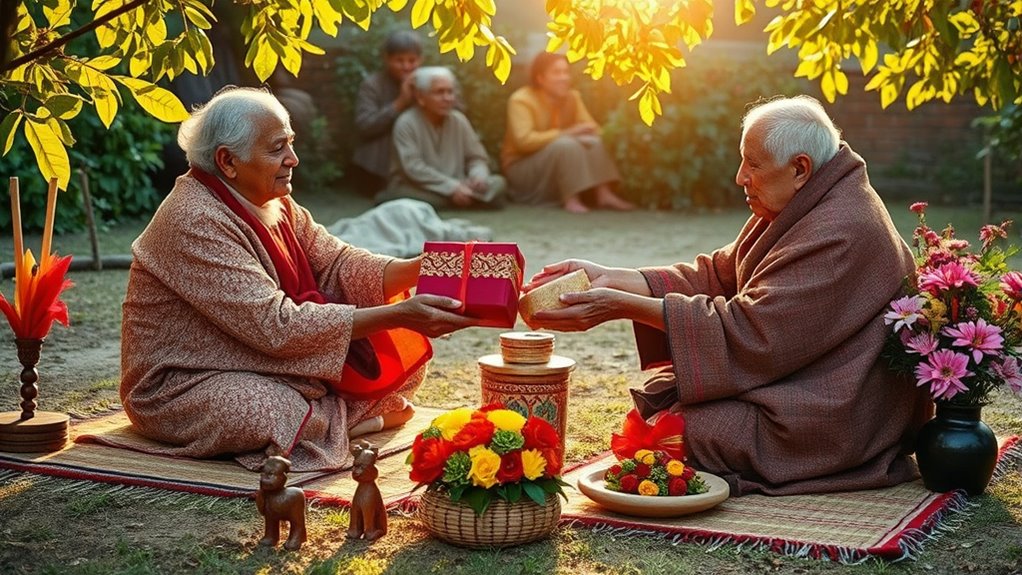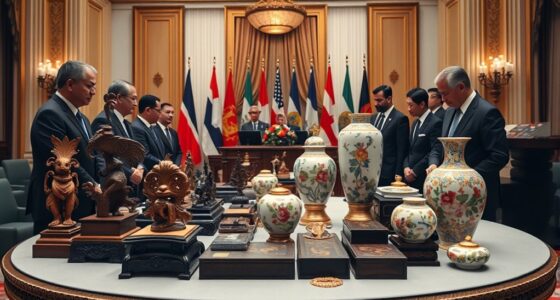Gifts play a vital role in conflict resolution rituals by symbolizing reconciliation, trust, and goodwill. They help restore relationships, reinforce social bonds, and communicate sincere intentions across various cultures. From ceremonial exchanges to symbolic tokens, gifts serve as neutral gestures that de-escalate tension and promote forgiveness. By understanding how different traditions incorporate gifts, you’ll see how these acts foster emotional healing and social cohesion—if you want to uncover more, keep exploring.
Key Takeaways
- Gifts symbolize reconciliation, trust, and goodwill, helping to de-escalate conflicts and rebuild relationships.
- Rituals incorporate gifts with cultural or spiritual significance to reinforce harmony and social bonds.
- The emotional impact of gift exchanges fosters forgiveness, emotional healing, and trust among conflicting parties.
- Gift-giving rituals serve as tangible commitments, emphasizing sincerity and encouraging ongoing cooperation.
- Cultural context and symbolism influence the effectiveness and perception of gifts in conflict resolution.
Historical Significance of Gift-Giving in Peace Practices

Throughout history, gift-giving has played an essential role in establishing and maintaining peace between conflicting parties. In medieval diplomacy, rulers used presents to symbolize goodwill and foster alliances, often during royal ceremonies that marked important peace treaties. These exchanges weren’t mere tokens; they conveyed trust, respect, and a willingness to resolve disputes. Gifts in this context helped reduce tensions and demonstrated the seriousness of diplomatic negotiations. During royal ceremonies, presenting valuable items or symbols of loyalty became a formal gesture to seal peace agreements. Such practices reinforced bonds between nations or factions, ensuring stability and cooperation. The historical significance of gift-giving in peace practices reveals its deep-rooted importance in diplomacy, serving as a tangible expression of intent and reconciliation.
Cultural Variations in Gift-Based Reconciliation Rituals
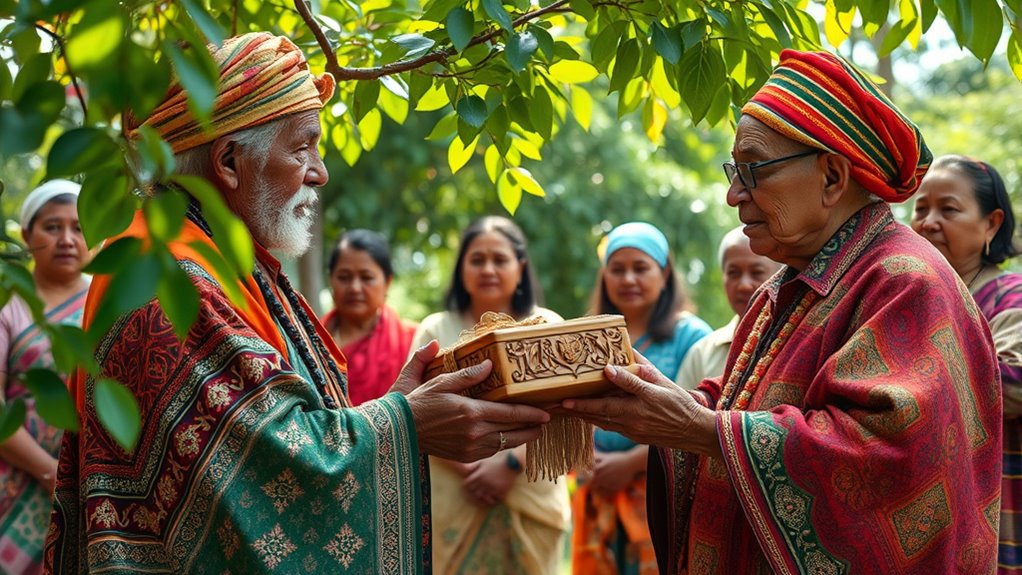
You’ll notice that gifts hold different meanings across cultures, shaping how conflicts are resolved. Rituals vary widely, from elaborate ceremonies to simple exchanges, reflecting each society’s values. Exploring these differences reveals how cultural significance influences reconciliation practices worldwide. For instance, the importance of material culture in gift-giving reflects deeper societal norms and traditions. Additionally, understanding goal tracking strategies can shed light on how communities adapt and refine their rituals over time to strengthen social bonds. Recognizing the role of attention in these practices highlights how focused engagement enhances the symbolic power of gift exchanges.
Cultural Significance of Gifts
Gifts play a pivotal role in reconciliation rituals because they symbolize goodwill, forgiveness, and the restoration of relationships. They serve as a powerful form of cultural expression, conveying values and social norms unique to each community. In many cultures, giving a gift signifies respect and acknowledgment of the other’s feelings, helping to rebuild trust. The act of presenting a gift fosters social bonding by creating a shared moment of peace and understanding. You’ll find that the significance of gifts varies widely across cultures, but their core purpose remains: to facilitate healing and reinforce social ties. Recognizing these cultural differences helps you appreciate how gift-giving acts as an essential tool for conflict resolution worldwide. Additionally, incorporating traditional ceremonial elements into gift exchanges can deepen the meaning and impact of reconciliation efforts. Moreover, understanding the emotional significance behind gift-giving can enhance its effectiveness in fostering genuine reconciliation. Incorporating traditional practices into gift exchanges can further strengthen the cultural relevance and emotional impact of the ritual.
Ritual Variations Worldwide
Around the world, cultures have developed diverse gift-based rituals to facilitate reconciliation, each reflecting unique social values and traditions. These rituals often incorporate cultural symbolism and ritual symbolism to reinforce harmony and restore relationships. For example:
- In Japan, gift exchanges symbolize respect and apologies, emphasizing harmony and humility.
- Among Native Americans, ceremonial gifts embody spiritual reconciliation and community renewal.
- In parts of Africa, sharing a symbolic item signifies unity and forgiveness, rooted in cultural symbolism.
- In Bali, ritual offerings and gifts serve as acts of reconciliation, emphasizing ritual symbolism to restore social balance.
- The contrast ratio of the gifts and rituals can influence the perceived sincerity and effectiveness of reconciliation efforts, highlighting the importance of visual and symbolic clarity. Additionally, the choice of gift materials often reflects cultural values and environmental considerations, further reinforcing the significance of the ritual. Recognizing the significance of cultural symbolism enhances the understanding of how these rituals foster trust and healing across different societies.
Symbolism Behind Gifts in Restoring Trust
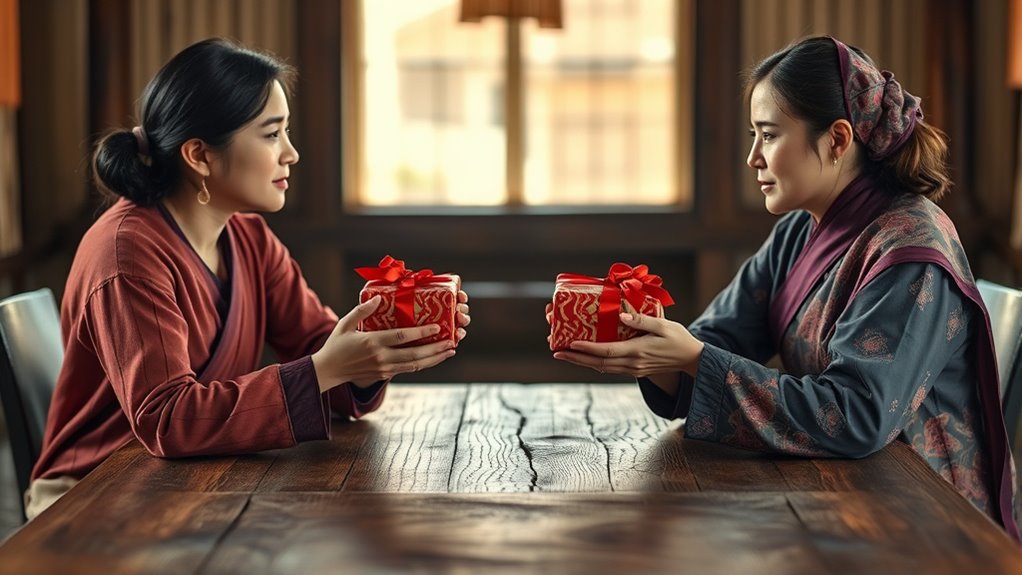
When trust has been broken, offering a gift serves as a powerful symbol of reconciliation and commitment to mending the relationship. The material value of the gift often reflects the seriousness of the apology, but its true power lies in the emotional symbolism it carries. A meaningful gift demonstrates that you acknowledge the hurt, show respect, and are dedicated to rebuilding trust. It’s not about monetary worth; rather, it’s about the thought and intention behind it. The symbolic act of giving helps both parties move past the conflict, signaling a desire for forgiveness and renewed connection. Recognizing the spiritual significance of gift-giving can deepen the emotional impact of this gesture and foster healing. Additionally, understanding the energetic alignment involved in gift exchanges can enhance their effectiveness in restoring harmony. In this way, the gift becomes a tangible reminder that compatibility can be restored through sincere gestures and shared understanding.
Types of Gifts Used in Conflict Resolution
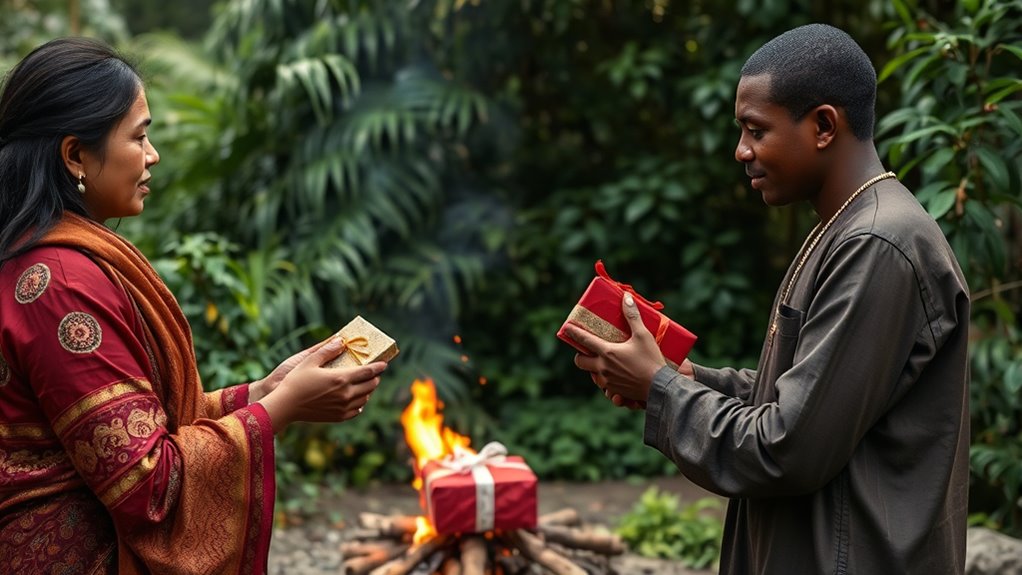
In conflict resolution, the types of gifts chosen often reflect the nature of the relationship and the severity of the disagreement. You’ll notice that gift symbolism and ritual significance guide these choices. Here are four common types:
- Tokens of apology – Small, meaningful objects like engraved items symbolize remorse. These tokens often carry personal significance and can serve as lasting reminders of reconciliation efforts. Understanding the cultural importance of these tokens can enhance their emotional impact.
- Traditional artifacts – Cultural or religious symbols reinforce shared values and commitment. Incorporating cultural significance into these gifts helps deepen the emotional impact and promotes mutual understanding.
- Practical gifts – Items like tools or supplies show a desire to rebuild and cooperate. Practical gifts can also demonstrate a commitment to future collaboration and harmony.
- Nature-based gifts – Flowers or plants symbolize renewal and growth. They also evoke feelings of hope and fresh beginnings in the healing process.
These gifts serve as tangible expressions of reconciliation, emphasizing their ritual significance and fostering healing in the process. The choice depends on the context, relationship, and what message you want to convey through gift symbolism. Additionally, understanding the dog breeds involved in a conflict can provide insight into appropriate gift choices, as different breeds may symbolize specific traits or emotions.
Rituals and Ceremonies Incorporating Gifts

Incorporating gifts into rituals and ceremonies transforms simple exchanges into powerful acts of reconciliation. When you participate in a gift exchange during these events, you’re engaging in more than just giving; you’re embodying ritual symbolism that signifies forgiveness, renewal, or unity. These rituals often involve specific gestures or objects that carry deep meaning, reinforcing the message of reconciliation. For example, a ceremonial gift exchange might include symbolic items like carved tokens or traditional offerings, emphasizing the importance of restoring relationships. By integrating gifts into these rituals, you create a tangible connection that facilitates emotional healing. The use of symbolic objects in rituals enhances their emotional and cultural significance, making reconciliation an active, meaningful process rooted in cultural or spiritual symbolism. Additionally, the choice of aesthetic presentation can elevate the perceived value of the gift, thereby strengthening the emotional impact of the ritual. Recognizing the presence of angel number symbolism can also deepen the spiritual meaning behind gift exchanges, adding a layer of divine guidance to the act of reconciliation.
Psychological Impact of Gift Exchange on Forgiveness
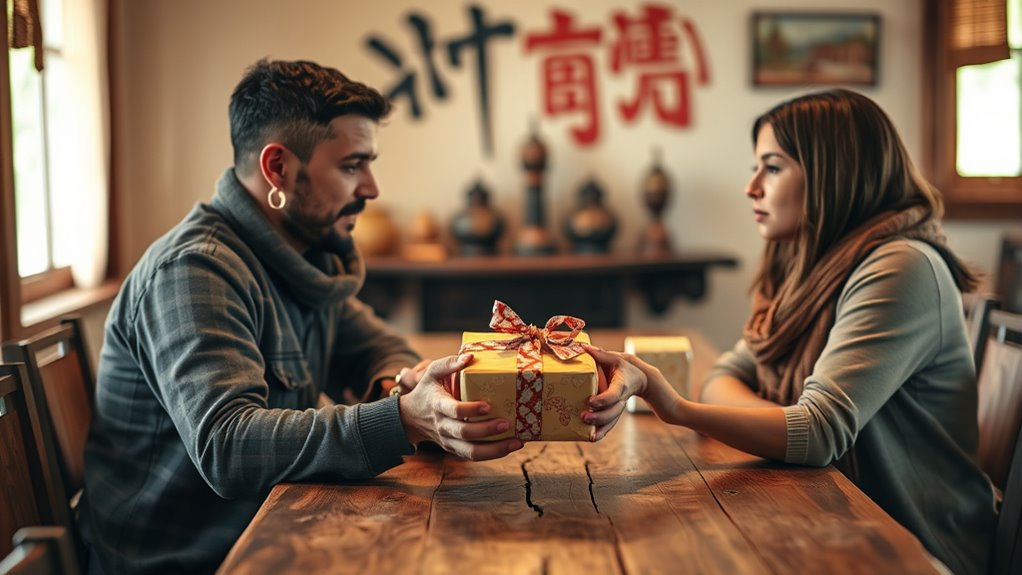
When you exchange gifts during conflict resolution, it can boost emotional healing and help you let go of resentment. This act often rebuilds trust, making it easier to move forward. Understanding these psychological effects highlights how gifts serve as more than just symbols—they aid in genuine forgiveness. Additionally, the act of giving can activate positive emotional responses, further strengthening the reconciliation process emotional healing and forgiveness. Recognizing the importance of trust-building mechanisms can enhance the effectiveness of these gift exchanges in fostering lasting reconciliation. Engaging in spiritual rituals and mindfulness practices can also deepen the emotional connection and promote personal growth throughout the reconciliation process.
Emotional Healing Enhancement
Gift exchanges during conflict resolution can considerably boost emotional healing by fostering forgiveness. When you participate in a gift exchange, you create a tangible symbol of reconciliation that promotes emotional closure. This act helps both parties process their feelings and move forward. Here are four ways it enhances emotional healing:
- Reinforces sincerity behind the apology or remorse.
- Provides a physical reminder of commitment to resolve issues.
- Encourages openness and vulnerability, strengthening emotional bonds.
- Eases the pain of past conflicts by symbolizing hope and renewal.
Additionally, understanding the importance of Grocery Savings Strategies can support emotional well-being by reducing stress related to financial concerns, contributing to a more peaceful resolution process.
Trust Rebuilding Effects
Engaging in a gift exchange during conflict resolution can substantially impact trust rebuilding between parties. The surprise element of an unexpected gift often triggers positive emotions, helping to break down barriers and foster forgiveness. Thoughtful gift selection shows effort and genuine intent, signaling commitment to reconciliation. When you choose a meaningful gift, it demonstrates respect and acknowledgment of the other person’s feelings, reinforcing trust. The act of giving, especially when it’s unexpected, can create a psychological shift, encouraging openness and reducing lingering resentment. This exchange helps re-establish emotional connections and rebuild confidence in the relationship. Incorporating mindfulness into the process can enhance the sincerity and emotional impact of the gesture, making the act of gift-giving even more meaningful. Regular use of exfoliation with glycolic acid may accelerate the renewal of damaged skin, symbolically mirroring the renewal of trust in the relationship. Additionally, understanding the importance of trust in relationship dynamics emphasizes how such gestures can facilitate emotional healing and reconciliation.
The Social Function of Gifts in Rebuilding Relationships

Gifts serve a powerful social function in rebuilding relationships because they symbolize a willingness to reconcile and restore trust. By giving and receiving, you influence interpersonal dynamics, signaling commitment to mending bonds. These exchanges foster social cohesion, reinforcing community ties and shared values. Here are four ways gifts fulfill this role:
- They demonstrate sincerity, encouraging open communication.
- They act as symbols of apology, reducing tension.
- They reaffirm mutual respect and understanding.
- They help re-establish cooperation and collective harmony.
Through these actions, gifts become essential tools in healing fractured relationships, emphasizing unity and shared purpose. They facilitate smoother interactions, helping both parties move forward with renewed trust and stronger social bonds.
Modern Adaptations of Traditional Gift-Giving Rituals

As societies evolve, traditional gift-giving rituals adapt to fit modern contexts, blending age-old symbolism with contemporary practices. Today, modern gift giving often involves digital exchanges, making conflict resolution more accessible and immediate. People now share virtual gifts or messages through apps or social media, maintaining the symbolic act across distances. This shift allows for quick reconciliation while preserving the ritual’s emotional significance. Here’s a look at some adaptations:
| Traditional Gift | Modern Equivalent | Purpose in Conflict |
|---|---|---|
| Handwritten letter | Email or message | Express apology or reconciliation |
| Physical token | Digital gift card | Symbolize goodwill in disputes |
| Personal visit | Video call | Reinforce connection remotely |
| Cultural artifact | Virtual cultural experience | Restore respect and understanding |
| Gift exchange ceremony | Online exchange platform | Formalize peace offerings |
Challenges and Criticisms of Gift-Based Reconciliation
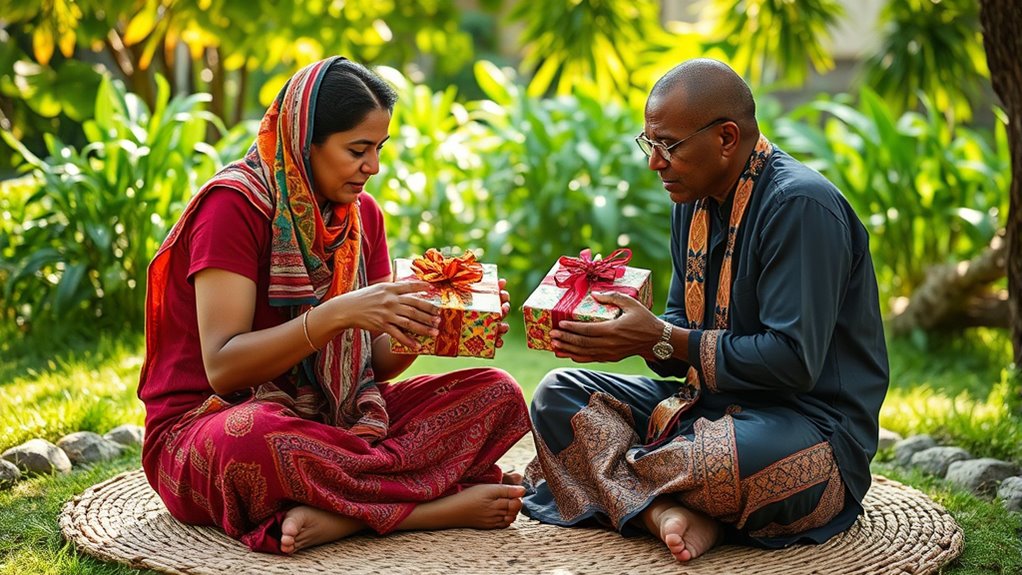
While gift-based reconciliation can effectively mend relationships, it also faces significant challenges and criticisms. One major issue is material scarcity, which makes it hard to find meaningful gifts, especially in impoverished communities. Ethical dilemmas also arise, such as whether giving gifts might imply obligation or favoritism, undermining genuine reconciliation. Additionally, some argue that gifts can mask underlying issues rather than resolve them, leading to superficial peace. In conclusion, cultural differences in gift-giving can cause misunderstandings or offend recipients. These challenges highlight that, despite their potential, gift-based rituals aren’t always straightforward solutions and require careful consideration to avoid reinforcing inequalities or ethical concerns.
Frequently Asked Questions
How Do Gift-Giving Rituals Differ in Secular Versus Religious Conflict Resolution?
You notice that secular traditions often focus on gestures of reconciliation, like simple exchanges or tokens, emphasizing mutual understanding. Religious symbolism in conflict resolution adds deeper meaning, using gifts imbued with spiritual significance to foster forgiveness and unity. While secular rituals prioritize practical reconciliation, religious rituals incorporate symbolism to reinforce faith and moral values. Both approaches aim to restore harmony, but their methods reflect their unique cultural or spiritual frameworks.
What Role Do Non-Material Gifts Play in Reconciliation Processes?
Imagine uncovering a power beyond material things—non-material gifts like symbolic gestures and emotional expressions. In reconciliation, you realize these acts forge deep connections, conveying sincerity and remorse without words. They act as silent acknowledgments of hurt, fostering trust and healing. These intangible gifts often carry more weight than possessions, helping you rebuild bonds and foster genuine understanding, turning conflict into a shared journey toward peace.
How Are Gift Exchanges in Conflict Resolution Documented Historically?
You want to know how gift exchanges in conflict resolution are documented historically. Historically, documentation varies across cultures; some record gift exchanges through written treaties, treaties, or diplomatic correspondence, while others rely on oral traditions and ritual descriptions. These records show how gift exchanges symbolize reconciliation and trust. By examining historical documentation, you can see how societies used gifts to formalize peace and restore relationships after conflicts.
Can Gift-Based Rituals Be Adapted for Digital or Virtual Conflict Resolution?
Imagine a virtual peace summit where participants exchange symbolic gifts through digital ceremonies, fostering reconciliation. You can adapt gift-based rituals for digital settings by creating virtual gift exchanges, like e-cards or digital tokens, to symbolize goodwill. This virtual adaptation keeps the tradition alive, encouraging connection and trust even across distances. Such digital ceremonies can be powerful tools, making conflict resolution more accessible and inclusive in today’s connected world.
What Are the Ethical Considerations Surrounding Gift-Giving in Reconciliation Efforts?
When you consider gift-giving in reconciliation, you need to respect cultural sensitivities and guarantee consent issues are addressed. Avoid gifts that might be misinterpreted or cause discomfort. Always seek genuine understanding and permission, recognizing that some cultures may view gift exchanges differently. By being mindful of these ethical considerations, you promote respectful, meaningful reconciliation efforts that honor all parties’ values and boundaries.
Conclusion
By embracing gift-giving in conflict resolution, you gently nurture trust and understanding, fostering harmony where tension once lingered. While it’s not a perfect remedy, this tradition offers a tender path toward reconciliation, reminding you that sometimes, a thoughtful gesture can open doors that words alone might not reach. When used wisely, gifts become subtle bridges, guiding relationships toward renewal without the need for grand gestures or undue pressure.
